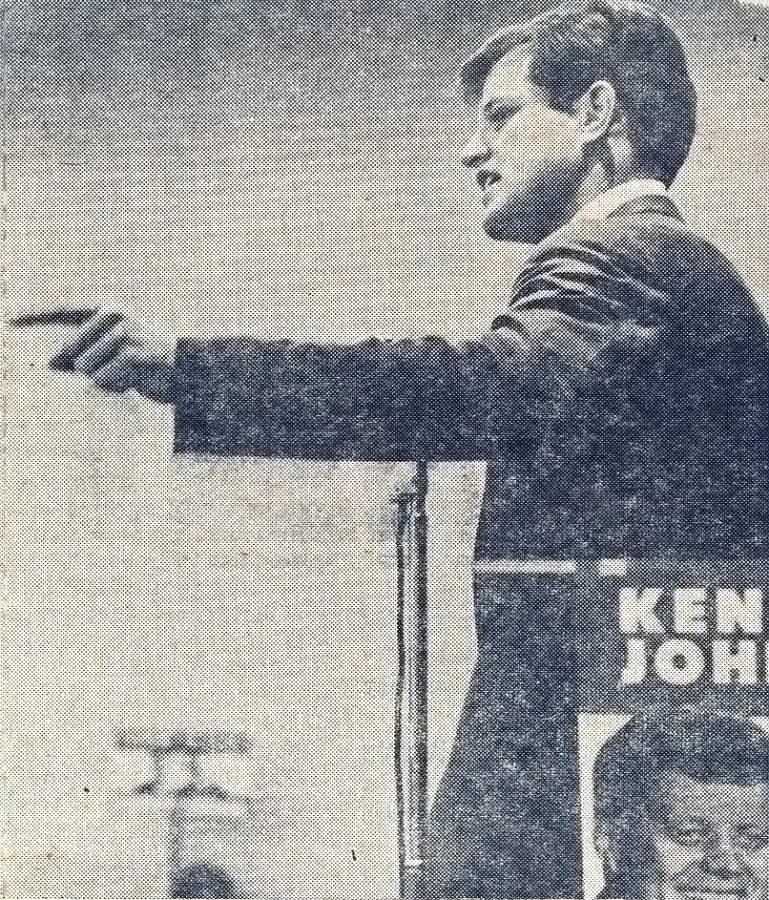Sen. Edward M. Kennedy was laid to rest Saturday night at Arlington National Cemetery, the last of the iconic Kennedy brothers. Like many larger-than-life figures, traces of the Kennedy legacy can still be found in the back issues of the Arizona Daily Wildcat, which stretch back to the newspaper’s founding in 1899.
In tracing the legendary liberal senator through history back to his first on-campus appearance in October 1960, it’s easy to think that the more things change, the more they stay the same. The pages of the Wildcat in those days featured Young Republicans accusing the Campus Democrats of socialism, angry letter writers charging the Wildcat with dropping the ball on a news story and a good, old-fashioned ASUA election scandal.
Ted Kennedy visited campus Oct. 24, 1960, in the midst of the heated presidential campaign between his older brother, Sen. John F. Kennedy, and then-Vice President Richard Nixon.
With the election approaching, the UA Kennedy Club and the Young Republicans regularly battled it out in the editorial pages of what was then the twice-weekly Arizona Wildcat. Today’s readers will be familiar with the terms of the debate.
“”This country’s future is at stake this year,”” said Boyd Gibbons of the Young Republicans in a Sept. 30, 1960 letter to the editor. “”Your clearness of political thinking will make the difference between a slide toward socialism, or a continuation of individual freedom.””
Carl Hodges, president of the UA Kennedy Club, fired back a week later.
“”If the Republican administration is against ‘socialism,’ why have they not repealed every major piece of so-called ‘socialistic’ legislation adopted under both Roosevelt and Truman? Why hasn’t the Eisenhower-Nixon Administration reduced the size of the federal government?””
A short brief, “”T. Kennedy to Speak,”” appeared in the Oct. 14, 1960 issue.
The article said Kennedy, serving as his brother’s campaign director for the western states, was visiting campuses throughout the region to promote student interest in political education.
Kennedy was slated to give a speech called “”The importance of politics.””
The Wildcat, however, neglected to cover Kennedy’s speech on Oct. 24, printing only a photo from the speech and an extended caption reading:
“”KENNEDY SUPPORTER — Ted Kennedy makes a point in his speech Monday before about 500 students in the Student Union Ballroom. Kennedy spoke in support of the candidacy of his brother, Jack, for the presidency of the United States. The younger Kennedy was sponsored by the UA Kennedy Club.””
The coverage drew criticism from at least one disgruntled reader, listed as W. Hanks II, who sounded off in an Oct. 28 letter to the editor.
“”This type of coverage leaves the reader as uninformed as the non-reader and shows that the staff of the Wildcat is either consummate in their bias or in their indolence,”” Hanks wrote.
Apparently, Kennedy didn’t do his older brother any favors at the UA. On Nov. 4, 1960, the Wildcat reported that Nixon trounced John F. Kennedy in a mock-election held on campus a week before the actual election. Nixon won 64 percent of the vote to Kennedy’s 35 percent.
In the same issue, the Wildcat reported that a cow named Daisy from the UA’s Dairy Research Center nearly won the election for Homecoming queen as a write-in candidate and protest against ASUA and dirty campaign tactics. However, the student government’s elections chairman refused to count the ballots.
John F. Kennedy would to go on to win the presidency (although Nixon carried Arizona), but all of the following week’s letters and editorials were devoted to the scandal of Daisy the cow.
“”We’re beginning to wonder what has happened to the sense of humor that is supposed to be typical of University students,”” the Wildcat said in an editorial dated Nov. 9, 1960, the day after Kennedy was elected President.
“”The bad feelings and feelings that have arisen from Daisy’s nomination and the subsequent events have evinced some poor sportsmanship and an inability to laugh at an obviously funny incident.””









